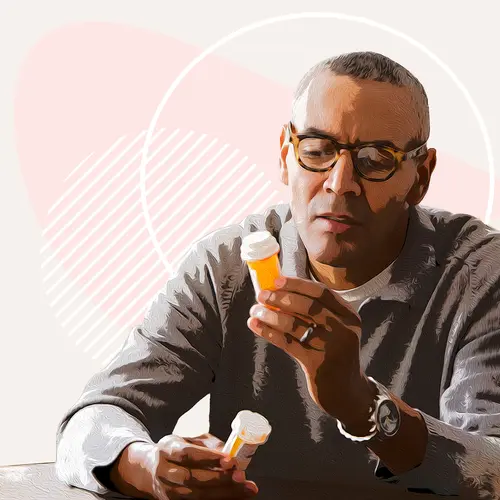By Spencer Kroll, MD, as told to Kara Mayer Robinson
Spencer Kroll, MD, PhD, is an internal medicine specialist at the Kroll Medical Group in Morganville, NJ. He is also a fellow of the American Board of Lipidology and director of the Northeast Lipid Association. He has been the principal investigator in numerous clinical trials for cholesterol treatment.
Managing high cholesterol and treating cholesterol disorders are critical when it comes to preventing cardiovascular and cerebrovascular diseases.
I’ve been studying cholesterol and lipid disease and spreading awareness for many years, and I’ve seen many misunderstandings and misconceptions about high cholesterol. Here are some things people don’t understand.
High cholesterol may cause more than heart problems.
While many people know high cholesterol can lead to a heart attack or stroke, they’re less aware that it can lead to other conditions and complications.
High cholesterol creates a slow, prolonged starvation of blood flow to your heart or brain. That can lead to progressive heart failure and dementia. Cholesterol deposits may also lead to hardened arteries, which, over decades of time, can lead to health problems.
A diet with low cholesterol doesn’t necessarily lead to lower blood cholesterol.
Many people think dietary cholesterol is the only thing that raises your blood cholesterol levels. This is untrue. Dietary cholesterol, which you get in foods like egg yolks, for example, has a small effect on your lipid levels.
Cholesterol problems can actually come from eating too much saturated fat and too many carbohydrates. If you have an excessive intake of saturated fat and carbohydrates, it can cause different types of lipid disorders.
Diet is important, but it doesn’t always control high cholesterol.
Many people know that in many cases, you can help control cholesterol with diet. In many cases, lifestyle changes like the right diet and more exercise can improve it significantly. But if your genes make you more likely to have cholesterol problems, you may need medication to help control it.
Cholesterol problems that are linked to your genes may require medication therapy in addition to proper lifestyle changes.
There isn’t a one-size-fits all solution.
A misconception about treating cholesterol is that there’s a one-size-fits-all approach. The lipidome, which consists of many separate parts of your lipid profile, is complex. It needs to be treated in a personalized way. Everyone is different and needs a personalized therapy to manage cholesterol.
Good cholesterol (HDL) doesn’t necessarily protect you.
Many people think having high HDL (high-density lipoprotein), or “good” cholesterol, protects you against heart disease in a linear fashion. This is not true. When your HDL is over a certain level, it may do the opposite. It can become dysfunctional and actually have a harmful effect on cardiovascular disease.
Your doctor will sort this out for you by measuring your HDL dynamics.
Statins aren’t all bad.
Over the past 2 decades, there’s been a lot of criticism of statin medication over side effects like liver toxicity, muscle pain, and memory problems.
But these side effects are uncommon. The cardiovascular benefits may outweigh these rare and often reversible side effects.
Statins have been tested in thousands of people in clinical trials and have a major impact on lowering your risk of cardiovascular disease and extending life expectancy.
Newer treatments are available.
For many years, the only effective therapy was statin medication. Now there are newer therapy treatment options.
Injectable medications are now available that you can give yourself every 2 weeks. There are medications to block cholesterol absorption that have been found to lower the risk of heart disease. These medications aren’t as powerful as statins, but they’re still an important part of cholesterol treatment.
It’s not all about fat intake.
People often believe that fat intake is the only thing that contributes to LDL (low-density lipoprotein, or “bad” cholesterol) problems. But we have more and more evidence that taking in too many carbs can also have a negative effect on cardiovascular disease. It’s important to avoid eating too many carbs, because that changes the function of LDL.
Children should be screened for high cholesterol.
With the increase in obesity and insulin resistance, we’re seeing a rise in early cardiovascular risk, which can be identified in children. Lack of exercise, taking in too many carbs, and childhood obesity are increasingly common. Together, they put children at high risk of developing cardiovascular disease later.
If pediatricians identify high cholesterol in children early, it can lead to an improvement in cardiovascular health.
Many food product claims are unproven.
Some consumer product claims about helping with cholesterol are valid. For example, oat bran, garlic, red rice yeast, and some supplements may have a positive effect on high cholesterol. But they’re minimal.
What’s more common are unproven claims about nutritional products. These products may only help reduce your risks.
Coconut products may be harmful.
Many people misunderstand the effects of products that contain coconut, like coconut water, coconut yogurt, and coconut spreads.
Coconut contains tropical saturated fat. This type of fat can raise your cholesterol and triglyceride levels and significantly compromise your vascular health.
Losing weight is one of the best ways to improve cholesterol.
One of the most effective methods to improve your cholesterol levels is weight loss. Even a slight amount of weight loss can have a significant effect on your lipids. But you have to maintain the weight loss for it to be effective.

